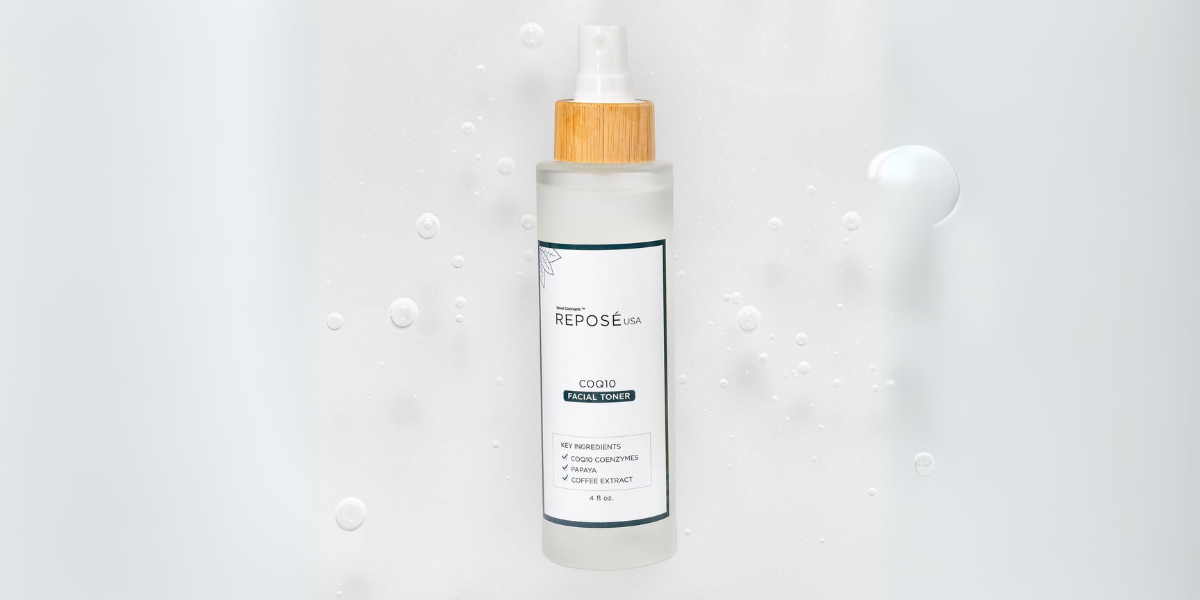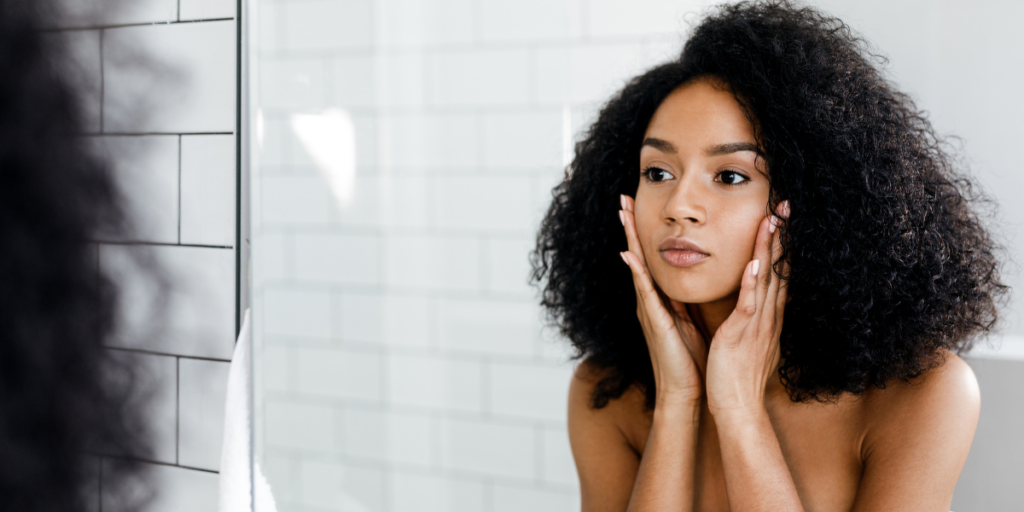Key Takeaways:
- Choosing the Right Toner for Aging Skin: Aging skin needs specific care to address issues like less collagen, more dryness, and sensitivity. Modern toners do more than cleanse; they balance pH, tighten pores, and improve absorption of moisturizers and serums. The right toner is vital for aging skin’s health and appearance and is an essential part of skincare.
- Key Ingredients for Aging Skin: Toners with antioxidants (such as vitamins C and E) combat free radicals, hyaluronic acid maintains moisture, and peptides boost collagen. These ingredients help tackle dryness, elasticity loss, and environmental effects, maintaining a youthful complexion.
- Incorporating Toner into Your Routine: After cleansing, apply toner with a cotton pad or hands, allowing it to absorb before using serums and moisturizers. This removes all impurities and prepares the skin for further treatments, enhancing their effectiveness and promoting resilient, healthy aging skin. Consider using Reposé CoQ10 Hydrating Facial Toner for this step. Its plant-based extracts and CoQ10 enzyme hydrate and revitalize, creating a solid base for your skincare routine.
Often overlooked in skincare routines, toners have evolved far beyond simple cleansing agents. They now offer numerous benefits such as balancing pH levels, tightening pores, and enhancing the skin’s absorption of moisturizers and other products. This becomes increasingly critical as skin ages, requiring the right toner to maintain its vibrancy and youth. This guide aims to illuminate the importance and selection of the ideal facial toner, especially for aging skin.
In your search for the perfect facial toner for aging skin, consider the Reposé CoQ10 Hydrating Facial Toner. Designed specifically to address the needs of maturing skin, this toner not only cleanses and balances pH levels but also prepares the skin to absorb subsequent products more effectively. Embrace the benefits of enhanced hydration and vibrancy with this key step in your skincare regimen.
Nourish Your Soul With Reposé’s Essence
Explore the Art of Reposé! Navigate your way to inner peace and external glow. With Reposé, living tranquility goes beyond mindset—it becomes your way of life. |
Understanding Aging Skin: Needs And Concerns
Changes In Aging Skin
As we age, our skin undergoes natural changes: it produces less collagen, leading to reduced elasticity and firmness. This can result in fine lines, wrinkles, and sagging. Additionally, the skin’s natural oil production decreases, causing dryness and making fine lines more visible. These changes highlight the importance of adjusting skincare routines to meet aging skin’s evolving needs.
Environmental Impact On Aging Skin
Aging skin is more susceptible to environmental damage from factors like sun exposure, pollution, and harsh weather conditions. These elements can accelerate aging signs by breaking down collagen faster and causing uneven skin tone and texture. Understanding this can help individuals prioritize protective ingredients in their skincare, such as antioxidants and sunscreens, to shield skin from external aggressors.
Essential Ingredients For Mature Skin
Addressing the needs of aging skin involves selecting products with key ingredients. Antioxidants like vitamins C and E combat free radical damage, while hyaluronic acid helps retain moisture, plumping up the skin and reducing the appearance of wrinkles. Retinoids promote cell turnover, revealing fresher, younger-looking skin, and peptides support collagen production, essential for maintaining skin’s elasticity and firmness.
Recognizing Sensitive Mature Skin
As skin matures, it often becomes more sensitive, making it crucial to choose products that are not too harsh or irritating. This sensitivity necessitates a delicate balance between effective anti-aging ingredients and formulations gentle enough to avoid aggravating the skin. Recognizing this balance is key in selecting the right products for an aging skincare routine.
The Role Of Facial Toners In Anti-Aging Skincare
Facial toners are essential in anti-aging skincare, connecting cleansing to moisturizing and offering benefits beyond mere skin preparation for additional products.
Restoring Skin’s pH Balance
After cleansing, skin’s pH may be off, causing dryness or oiliness. A quality toner, like Reposé CoQ10 Hydrating Facial Toner, can quickly restore pH balance, promoting healing and rejuvenation essential for a youthful appearance. Incorporate it into your regimen to maintain a healthy, glowing complexion, especially important after cleansing.
Enhancing Skin Elasticity And Firmness
Toners designed for aging skin often contain ingredients like peptides and hyaluronic acid, which are key for boosting collagen production and hydration. Regular use of these toners can help increase skin elasticity and firmness, reducing the appearance of fine lines and wrinkles.
Preparing Skin For Moisturizers And Serums
By removing any lingering impurities and residues, facial toners ensure that the skin is clean and receptive, enhancing the absorption and efficacy of serums, moisturizers, and other treatments applied afterward. This means that the active ingredients in anti-aging products can penetrate more deeply and work more effectively.
Offering Additional Anti-Aging Benefits
Many modern toners are infused with specialized ingredients that target aging skin concerns, such as antioxidants to fight free radical damage, or exfoliants like glycolic acid to promote cell turnover and reveal fresher, younger-looking skin underneath.
Top Recommended Facial Toners For Aging Skin
Below is a list of top facial toners for aging skin, specifically designed to hydrate, repair, and rejuvenate:
Hydrating Toner With Hyaluronic Acid
For those battling dryness and fine lines, a toner enriched with hyaluronic acid can be a game-changer. This powerful humectant draws moisture into the skin, plumping it up and smoothing out wrinkles. Look for a formula that combines hyaluronic acid with soothing botanicals to hydrate and calm aging skin simultaneously.
Brightening Toner With Vitamin C
Vitamin C is a powerhouse antioxidant that not only combats free radical damage but also brightens the complexion and evens out skin tone. A toner infused with Vitamin C can help fade age spots and hyperpigmentation, resulting in a more radiant, youthful glow.
Exfoliating Toner With AHA/BHAs
Exfoliating toners containing alpha-hydroxy acids (AHAs) or beta-hydroxy acids (BHAs) can be beneficial for aging skin, helping to remove dead skin cells and promote cell turnover. This can lead to smoother, more even-textured skin. However, these should be used cautiously and not every day, as over-exfoliation can irritate and damage mature skin.
Soothing Toner With Antioxidants And Peptides
A toner that combines antioxidants like green tea or vitamin E with peptides can help repair and protect aging skin. Antioxidants fight oxidative stress and environmental damage, while peptides support collagen production, firming the skin and reducing the appearance of wrinkles.
Alcohol-Free Toner For Sensitive Mature Skin
For aging skin that’s also sensitive, an alcohol-free toner is a must. These gentler formulas help to soothe and calm the skin without the harsh drying effects associated with alcohol, making them ideal for daily use.
Incorporating Facial Toner Into Your Skincare Routine
Integrating a facial toner into your daily skincare routine can enhance your skin’s health and appearance, especially as it ages. Here’s a step-by-step guide to effectively use facial toner as part of your skincare regimen:
Step 1: Cleanse Your Skin
Begin with a gentle cleanser suitable for your skin type to remove dirt, oil, and impurities. Cleansing prepares your skin for the toner, allowing it to penetrate deeply and work more effectively.
Step 2: Apply The Toner
After cleansing, pour a small amount of toner onto a cotton pad or into the palms of your hands. Gently apply the toner to your face and neck, avoiding the eye area. Do not rinse off. For those using spray toners, you can spritz directly onto your skin and then gently pat it in with your hands.
Step 3: Wait And Let Your Skin Absorb The Toner
Allow your skin a moment to absorb the toner. This step helps prime your skin for the next products in your routine, such as serums or moisturizers.
Step 4: Continue With Your Skincare Routine
Once the toner has absorbed, proceed with applying your favorite serum, targeting specific skin concerns such as fine lines, dark spots, or dehydration. Follow up with a moisturizer to lock in hydration and protect your skin barrier. If applying in the morning, finish with a broad-spectrum sunscreen to guard against sun damage.
Final Thoughts
The value of a well-chosen facial toner in anti-aging skincare is significant. As skin ages, it requires targeted support to address concerns like dryness, loss of elasticity, and environmental damage. Modern toners meet these needs by restoring balance, preparing the skin for further treatments, and strengthening its defenses. Therefore, a facial toner is not just an extra step but an essential part of a skincare routine, enhancing the regimen’s overall effectiveness and ensuring comprehensive care for aging skin. Choosing the right toner is crucial for nurturing a healthier, more youthful complexion.
For those looking to enhance their anti-aging regimen, Reposé CoQ10 Hydrating Facial Toner could be the perfect addition. This toner is specifically designed to hydrate and rejuvenate aging skin while restoring balance and preparing it for subsequent treatments. It’s a key step towards achieving a healthier, more youthful complexion.
Read Also:
Frequently Asked Questions
What changes occur in aging skin that affect its skincare needs?
Aging skin experiences decreased collagen production, leading to less elasticity and firmness, increased dryness due to reduced natural oil production, and heightened sensitivity. These changes necessitate a skincare routine tailored to address these specific concerns.
How does environmental exposure impact aging skin?
Aging skin is more vulnerable to damage from sun exposure, pollution, and harsh weather, accelerating aging signs like wrinkles and uneven skin tone. Protecting aging skin from these elements is essential to maintain its health and appearance.
Why are antioxidants and hyaluronic acid important for aging skin?
Antioxidants like vitamins C and E help protect aging skin from free radical damage, while hyaluronic acid aids in hydration, reducing the appearance of wrinkles and maintaining skin plumpness.
Can facial toners improve skin elasticity and firmness?
Yes, toners formulated for aging skin often contain ingredients like peptides and hyaluronic acid, which can boost collagen production and hydration, thereby improving skin’s elasticity and firmness.
How can a facial toner benefit sensitive mature skin?
For sensitive mature skin, using a gentle, alcohol-free toner can soothe and calm the skin without causing irritation, making it an integral part of the skincare routine.
Are exfoliating toners suitable for all aging skin types?
While beneficial for removing dead skin cells and promoting cell turnover, exfoliating toners should be used cautiously, especially for those with sensitive or easily irritated skin. They should not be used daily to avoid over-exfoliation.
How should a facial toner be applied as part of a skincare routine?
After cleansing, apply toner to a cotton pad or directly to the hands, then gently pat onto the face and neck. Allow the toner to absorb before proceeding with the rest of your skincare regimen.
Can a facial toner replace a cleanser?
No, a facial toner is not a substitute for a cleanser. It should be used after cleansing to remove any lingering impurities and prepare the skin for subsequent products.
What should I look for in a toner if I have aging skin?
Look for toners with hydrating ingredients, antioxidants, and skin-repairing compounds such as peptides and vitamins, and avoid those with high alcohol content to prevent drying out the skin.
Is it necessary to use a different toner in the morning and at night?
Not necessarily, but you may choose to use a more hydrating toner in the evening and a lighter, refreshing toner in the morning, depending on your skin’s needs and preferences.
Sources:
- Vierkötter, A., & Krutmann, J. (2012). Environmental influences on skin aging and ethnic-specific manifestations. Dermato-Endocrinology, 4(3), 227–231. https://doi.org/10.4161/derm.19858
- Mukhopadhyay, P. (2011). Cleansers and their role in various dermatological disorders. Indian Journal of Dermatology, 56(1), 2. https://doi.org/10.4103/0019-5154.77542
- Pullar, J. M., Carr, A. C., & Vissers, M. C. M. (2017). The Roles of Vitamin C in Skin Health. Nutrients, 9(8), 866. https://www.ncbi.nlm.nih.gov/pmc/articles/PMC5579659/
- Michalak, M. (2022). Plant-Derived Antioxidants: Significance in Skin Health and the Ageing Process. International Journal of Molecular Sciences, 23(2), 585. https://doi.org/10.3390/ijms23020585










